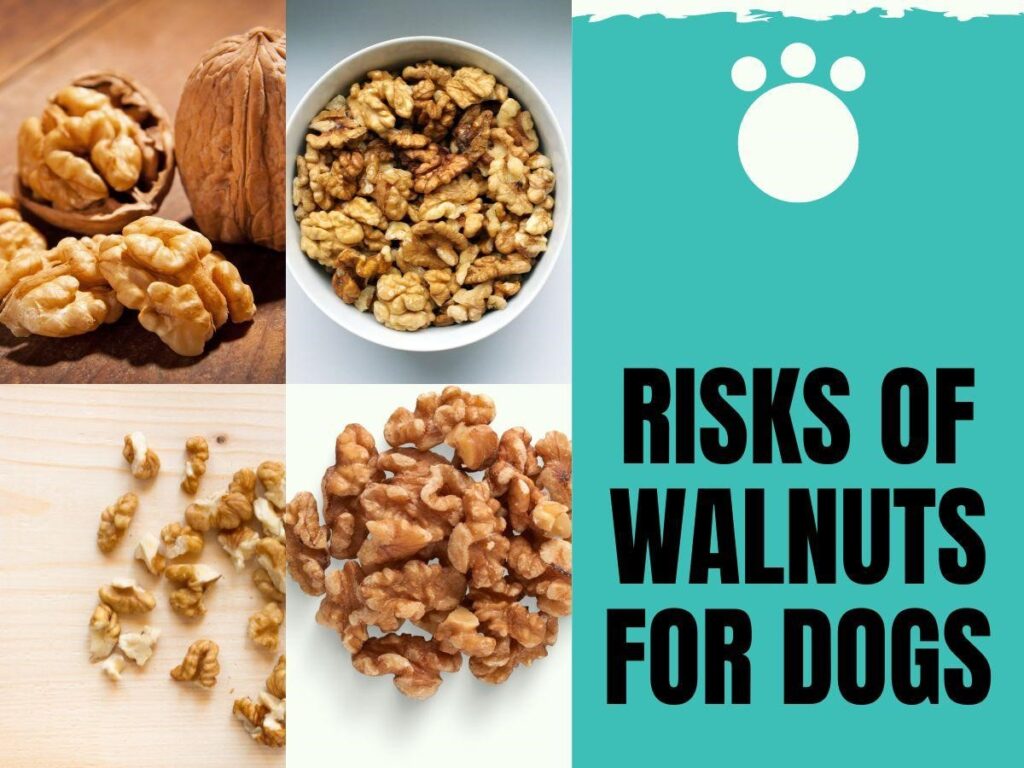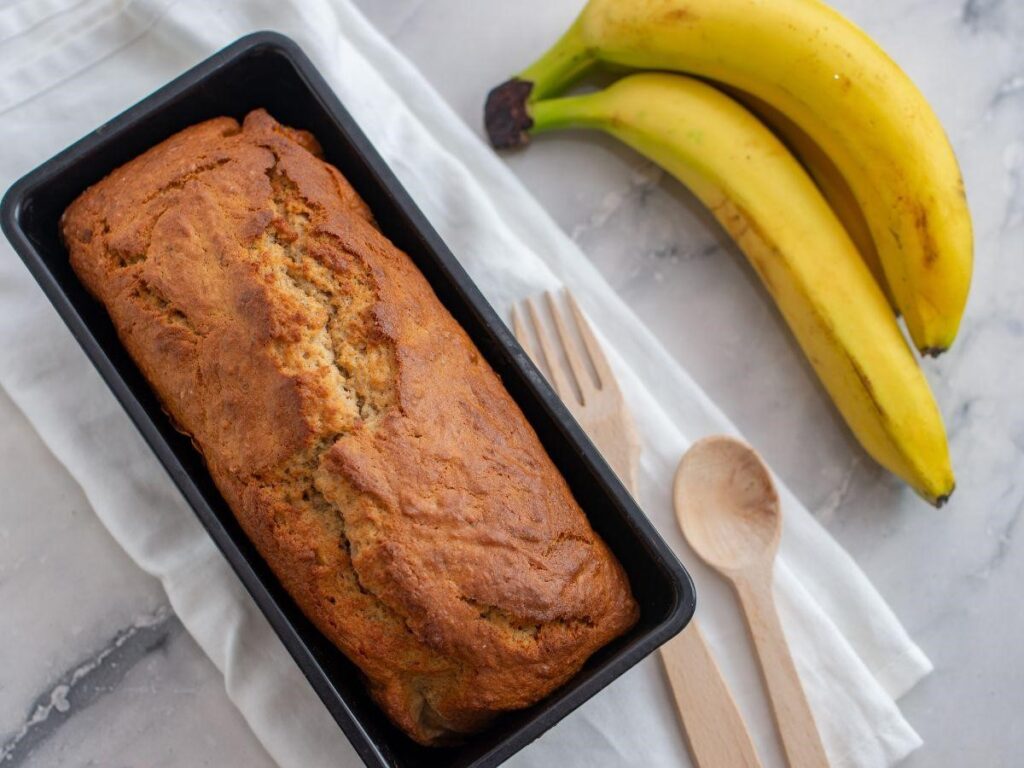As a dog owner, you may want to share your wonderful banana bread with your canine companion. While bananas are typically acceptable for dogs, adding walnuts can complicate matters.
So, can dogs eat banana bread with walnuts? While bananas are normally healthy for dogs, walnuts are unsafe.
Before you feed your dog banana bread with walnuts, here’s what you should know:
Risks of Walnuts for Dogs

Walnuts can harm dogs because they contain substances that make them unsuitable for consumption.
The primary concerns are the high-fat content and the presence of a substance called juglone.
Walnuts have a considerably high-fat content, which can lead to digestive issues, such as pancreatitis, in dogs.
Additionally, juglone, found in the leaves, husks, and shells of walnuts, is toxic to dogs and can cause various health problems if ingested.
Pancreatitis and Digestive Problems
- Due to their high-fat content, walnuts might be difficult for a dog’s digestive tract
- Large amounts of fat are difficult for dogs to break down and metabolize, which can cause gastrointestinal disturbance, including symptoms such as diarrhea, vomiting, and stomach discomfort.
- In more extreme situations, walnut eating can cause pancreatitis, an inflammation of the pancreas that can be fatal in dogs.
- Pancreatitis symptoms include abdominal pain, loss of appetite, dehydration, and tiredness.
Choking and Obstruction Risks
- Aside from the hazards linked with walnut composition, the shape and size of walnuts constitute a possible hazard to dogs.
- If consumed, the hard shell of walnut can induce blockages or obstructions in a dog’s digestive tract.
- It can result in severe problems such as gastrointestinal irritation, pain, and, in extreme circumstances, emergency surgery to remove the blockage.
- Furthermore, the form and size of walnuts pose a choking threat for dogs, particularly small breeds or those who gulp their food without properly eating it.
while walnuts are not harmful to dogs, they can pose several concerns to your canine companion.
Avoid giving your dog walnuts entirely, especially if they are moldy or black.
If you suspect your dog has eaten walnuts or is exhibiting strange symptoms, seek veterinary assistance immediately.
You can help keep your dog healthy and happy for years by knowing what foods are safe.
Risks of Ingredients in Banana Bread for Dogs

Banana bread is a delicious delicacy that many people enjoy, but when it comes to sharing it with our four-legged friends, we must exercise caution.
While bananas safe for dogs, the other substances commonly included in banana bread can harm their health.
In this blog post, we’ll look at the potential risks of various ingredients in banana bread and why it’s crucial to be cautious when serving this baked item to your canine companion.
Unhealthy Additions: Sugar and Artificial Sweeteners
- Sugar or artificial sweeteners like xylitol are frequently used in banana bread.
- While natural sugar is typically harmless for dogs, excessive consumption can lead to weight gain, diabetes, and dental problems.
- Artificial sweeteners, such as xylitol, are particularly hazardous to dogs, causing a rapid drop in blood sugar levels, leading to seizures, liver failure, or even death.
- It is critical to avoid offering your dog banana bread with extra sugar or artificial sweeteners.
Chocolate: A Dangerous Substitute
- Chocolate is one of the key worries regarding banana bread.
- Many banana bread recipes call for chocolate chips, which contain theobromine, a dog toxin.
- Theobromine can induce various symptoms in dogs, such as elevated heart rate, restlessness, vomiting, diarrhea, and even seizures.
- To avoid accidental intake and associated health concerns, keep banana bread containing chocolate out of reach of your dog.
Toxic Threats from Raisins and Grapes
- Some banana bread recipes call for raisins or grapes as extra ingredients.
- However, raisins and grapes are poisonous to dogs and can result in kidney failure.
- Even small quantities can cause significant side effects such as vomiting, loss of appetite, abdominal pain, and increased thirst and urine.
- It’s critical to ensure your banana bread doesn’t contain raisins or grapes and to keep these items out of your dog’s reach
Knowing the potential risks linked with particular components is critical while sharing banana bread with your dog.
Chocolate, almonds, raisins, grapes, sugar, and artificial sweeteners can harm dogs’ health.
As responsible pet parents, we must prioritize our furry friends’ well-being and ensure that any treats we feed them are safe and appropriate for their intake.
We may continue to demonstrate our love for our dogs while keeping them healthy and happy by understanding the dangers and selecting handmade dog-friendly alternatives.
So, Can Dogs Eat Banana Bread with Walnuts?
No, dogs can not eat banana bread with walnuts. While bananas are generally safe for dogs in moderation, walnuts can be dangerous.
Walnuts are heavy in fat, which can cause digestive problems and even pancreatitis in dogs.
Furthermore, the shape and size of walnuts might constitute a choking hazard or cause clogs in the digestive tract of dogs, particularly tiny dog breeds.
To safeguard your pet’s safety and well-being, avoid offering them banana bread with walnuts.
Can Dogs Eat Banana?

Dogs can consume bananas. When given in moderation, bananas are a nutritious treat for dogs.
Bananas are high in potassium, vitamins B6 and C, biotin, fiber, and copper, aiding bone building, protein production, vitamin absorption, and gastrointestinal issues.
However, because bananas are high in sugar, you should only serve them to your dog in moderation.
Smaller doses should be given to pups and dogs to avoid stomach distress.
Benefits of Feeding Bananas to Dogs
Feeding bananas to dogs in moderation can provide various potential health and well-being benefits. Here are some of the advantages of feeding bananas to dogs:
Nutritional Value:
- Bananas are high in potassium, vitamin C, vitamin B6, dietary fiber, and magnesium, all necessary for dogs.
- These nutrients help a dog’s overall health by maintaining normal muscle function, supporting the immune system, and fostering good digestion.
Digestive Health:
- Bananas include soluble and insoluble fibers, which can help regulate bowel motions and maintain a healthy digestive system in dogs.
- Bananas’ fiber content can help dogs with constipation or diarrhea as a natural cure for minor digestive difficulties.
Energy boost:
- Bananas are a natural carbohydrate source that provides dogs with a rapid and easily digestible energy boost.
- It is especially useful for active, working dogs and those participating in agility training or strenuous physical activity.
Electrolyte Balance:
- Bananas are high in potassium, an essential element that aids in maintaining correct electrolyte balance in a dog’s body.
- Adequate potassium levels are essential for adequate muscle and neuron function and heart function.
Coat and Skin Health:
- The vitamin C component of bananas can help with collagen formation, which is necessary for dogs to have healthy skin and a lustrous coat.
- Bananas in their diet can improve skin health and promote a shiny coat.
Natural Treat:
- Bananas can be healthy and natural dog treats.
- Bananas’ sweet taste and creamy texture appeal to many dogs, offering them a healthy alternative to commercial treats that may contain artificial additives or excessive added sugars.
Remember that while bananas have potential benefits for dogs, they should be fed in moderation.
Too much of any food, including bananas, can cause stomach distress or a nutritional imbalance.
It’s always a good idea to talk with your veterinarian about the proper quantity and frequency of giving bananas to your dog, depending on their needs and nutritional requirements.
Can Dogs Eat Banana Peel?

While dogs can eat banana peels, it is not generally suggested.
Although banana peels are not poisonous to dogs, they can be difficult to digest and may cause gastrointestinal problems.
The peel is rough and fibrous, making it difficult for a dog’s digestive tract to digest.
If a dog consumes a large piece of banana peel, it may cause a blockage in the digestive tract, resulting in serious health concerns that may necessitate veterinarian intervention.
Conclusion
Finally, feeding dogs banana bread with walnuts is not advised.
While bananas are generally acceptable for dogs to eat in moderation, walnuts can harm their health.
High-fat walnuts can cause digestive difficulties, pancreatitis, and possible digestive tract blockages.
Furthermore, the form and size of walnuts might be a choking hazard, particularly for smaller dog breeds.
To prioritize your animal friend’s well-being and safety, avoid providing their banana bread with walnuts.
Instead, consider giving them dog-friendly treats prepared with safe ingredients and matched to their nutritional requirements.
We can safeguard our dogs’ health and happiness by making thoughtful food selections.
